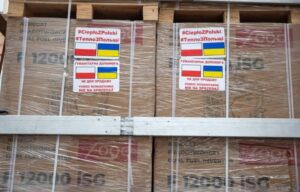
In 2025, Ukraine imported 123,600 tons of potatoes, which is 2.4 times more than in 2024; the cost of purchasing them increased 2.5 times to $66.29 million, according to the State Customs Service.
Poland (37.1%), Egypt (13.56%), and the Netherlands (11.58%) became the leaders in potato supplies to Ukraine.

The Polish government’s Agency for Strategic Reserves (RARS) has sent the first batch of generators announced for Ukraine as part of its assistance in overcoming the consequences of Russian shelling, the Embassy of the Republic of Poland in Kyiv reported on Thursday.
“The first batch of generators sent by RARS is already in Kyiv. Poland’s Chargé d’Affaires in Ukraine, Piotr Lukasiewicz, officially handed them over today to Deputy Prime Minister Oleksiy Kuleba and the head of the Kyiv Regional Administration, Mykola Kalashnik,” the embassy said in a statement on social media.
Deputy Prime Minister for the Restoration of Ukraine – Minister of Community and Territorial Development of Ukraine Oleksiy Kuleba said that 379 generators have already been received and some of them have already been transferred to the Kyiv region.
“We have received energy support from Poland – 379 generators of various capacities. Today, the first batch of equipment was delivered to the Kyiv region. By the end of January, all aid will be distributed among the communities,” he wrote on X.
The Deputy Prime Minister also announced that the Polish government has already decided to purchase an additional ten high-capacity generators.
He explained that the Kyiv region is under constant Russian attack and “knows well what power outages and risks to basic services mean.” “The generators will ensure the stable operation of critical infrastructure – water, heat, and electricity supply,” Kuleba said.
As reported, last week Lukasiewicz announced the arrival in Kyiv of 400 generators of various types from Polish government reserves.
Earlier, it was also reported that as part of a nationwide fundraising campaign for generators for Ukraine called “Warmth from Poland for Kyiv,” more than PLN 5 million (over $1 million) had already been raised. The campaign was organized by the Polish Stand with Ukraine Foundation.

In January-December 2025, Ukraine imported 138,410 tons of potatoes, which is 5.3 times (+431.3%) more than in 2024, when 26,050 tons were imported into the country, according to the State Customs Service.
According to published statistics, in monetary terms, potato imports increased 4.9 times (+391.9%) to $74.82 million compared to $15.21 million a year earlier. The main imports came from Poland (38.2%), Egypt (14.1%), and the Netherlands (10.8%).
Potato exports from Ukraine during the same period amounted to 2.38 thousand tons, which is 11.2% less than in 2024 (2.68 thousand tons). At the same time, despite the physical reduction in export volumes, in monetary terms, the sale of Ukrainian potatoes abroad was more profitable and brought in 3.1% ($584 thousand) more revenue than in 2024 ($566 thousand). The main buyers were Moldova (60.2% of all exports), Azerbaijan (35.4%), and Georgia (1.2%).
As reported, Ukraine had a poor potato harvest in the 2024 season due to drought, extremely high temperatures, and a lack of seed material.
Deputy Minister of Economy, Environment, and Agriculture Taras Vysotsky noted in a podcast by the Center for Economic Strategies that the 2025 vegetable harvest in Ukraine is sufficient and even larger than last year, so no shortage is expected in this sector.
Commenting on Ukraine’s potato imports in 2024-2025, Mykola Furdyga, director of the Potato Institute, explained that this record volume of imports was caused by the unusual weather conditions in 2024. Therefore, the state was forced to import potatoes to meet domestic food needs. European countries were eager to supply Ukraine with their products due to their attractive prices. At the same time, potatoes from Egypt did not dominate the market but occupied their traditional niche in the off-season (February-March – IF-U). In addition, Ukraine traditionally imports seed potatoes from leading breeding companies in the European Union.
Furdyga noted that since the beginning of the war, there has been a trend in Ukraine toward reducing potato cultivation in households and expanding production areas for this crop in farms and even in agricultural holdings. He explained this trend by the departure of the population from villages abroad and mobilization.

In Poland, as part of the charity campaign “Warmth from Poland for Kyiv,” more than PLN 1 million was raised to purchase generators for the Ukrainian capital, according to the Polish publication OKO.press.
According to the organizers, the fundraiser was initiated by the Stand With Ukraine foundation in collaboration with a number of public organizations. Initially, the plan was to raise PLN 1 million to purchase 100 generators, but the goal was achieved within a few hours, after which it was decided to extend the campaign and raise the new target to PLN 2 million. At the time of publication by ZAXID.NET, the amount raised was about 1.1 million zlotys.
Stand With Ukraine Foundation President Natalia Panchenko said that the response from donors reminded her of the wave of support for Ukraine in 2022, emphasizing that solidarity remains stronger than disinformation and attacks on social media.
According to reports, Ukraine’s ambassador to Poland, Vasyl Bodnar, responded to the initiative by expressing his gratitude to the participants in the fundraiser and noting the importance of support in the context of the complicated energy supply situation.

The passage of trucks with cargo through the checkpoints on the Polish border “Medika” (in Ukraine, the checkpoint “Shegini”), “Khrebenne” (in Ukraine, “Rava-Ruska”) has been suspended, and at the ‘Korchova’ checkpoint (in Ukraine, “Krakovets”), it has been slowed down, the State Border Service reported on its Telegram channel on Sunday.
“According to information from the Polish side, the database used to process freight vehicles leaving Ukraine (entering the Republic of Poland) has been temporarily suspended at the Medyka and Hrebenne border crossing points. At the Korczowa checkpoint, the Polish customs service database is operating at a slower pace,” the border guards said in a statement.
Empty freight vehicles are being processed as usual. Other types of transport are undergoing border and customs procedures without any changes.
“According to preliminary information, the Polish customs database is expected to resume full operation by 10 p.m. (Ukrainian time) on January 18, 2026,” the State Border Service said in a statement.

In January-November 2025, Ukraine imported 44.18 thousand tons of coffee and 10.21 thousand tons of tea, which is 0.6% and 13.3% less than in the same period of 2024, according to the State Customs Service.
According to published statistics, in monetary terms, coffee imports increased by 39.2% to $352.18 million compared to $252.97 million for the same period a year earlier.
The main suppliers of coffee to Ukraine in the first 11 months of this year were Poland, which accounted for 15.5% of imports, or $54.67 million in monetary terms, Germany – 13.1% and $46.24 million, and Italy – 11.9% and $41.86 million.
A year earlier, the top three coffee suppliers to Ukraine for the corresponding period remained unchanged, except for their share in supplies: Poland (16.2%, $41.07 million), Italy (15.3%, $38.63 million), and Germany (13.1%, $33.09 million).
Tea imports during January-November 2025 decreased by 11.9% in monetary terms, to $38.92 million, compared to $44.19 million last year.
At the same time, the top three tea suppliers to Ukraine for the first 11 months of this year remained unchanged: Sri Lanka (30.3% or $11.8 million), Kenya (17.6% or $6.86 million), and China (12.5% or $4.85 million). Last year, these countries accounted for 31.6%, 20.1%, and 10.8% of the market, with tea supplies to Ukraine bringing them $13.96 million, $8.87 million, and $4.791 million, respectively.